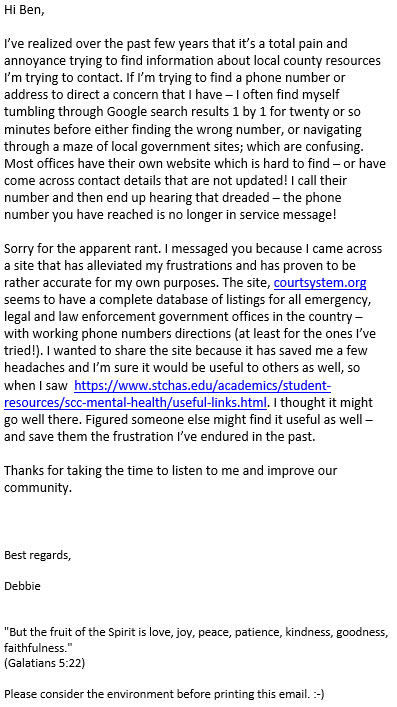by Nick Hogan
St. Charles Community College
Cottleville, MO

A few months ago the email below was forwarded to me. It’s marketing spam. I’m sure a lot of you (or your web people) receive similar emails on a regular basis, so I want to point out where this email succeeds and where it fails. Hopefully, this will give you a better idea of whether to take action or ignore it.

WHAT THEY GOT RIGHT
I’ll admit that on the first read I thought this was legit – just a community member trying to make our website more helpful.
The whole email comes across as very organic and conversational. Who hasn’t gotten frustrated on the internet and considered sending an email like this? That’s what makes this email good – the complete relatability of it. There are other little things that help disguise this. The bible passage in the signature and the bit about considering the environment before printing – that’s brilliant stuff. They even used a slightly different font to seem like it was sloppily done. Awesome!
WHAT THEY GOT WRONG
Here’s what I saw on the second and third reads that convinced me it’s spam.
1. They talk about thumbing through pages of Google search results to find a local phone number, only to find it’s the wrong number or no longer in service. Then they recommend a magical website that’s going to have up-to-date info – courtsystem.org. I don’t know how courtsystem.org is getting their information, but I know they’re not calling every police station, lawyer’s office and courthouse to get updated contact info to post on their website. Too many man hours. Just not possible.
2. You probably won’t notice this, because it’s completely unique to our website, but the URL they provided has .html on the end. Weird, because our site doesn’t use that anymore. In February we redesigned our website, which meant there was a slight change in our permalinks and our pages no longer end in .html. I received this email in May. Don’t talk to me like you found my site this morning and wanted to help me out on a page that hasn’t existed for months. The takeaway here is to inspect and investigate all aspects of the email. Every mistake or typo can help you answer the question, “Is this spam?”
3. Wait a minute. There’s actually nothing in this email that is distinct to our site. Nothing! This is really where the email failed. If you don’t want recipients to think your email was written by a robot, then throw something in that a robot can’t notice (e.g., “I really love your site design and the red/maroon on the logo and in the main navigation really pop on the white background. Great stuff.”) If that request you just received didn’t say something unique and human about your site – it’s spam!
4. Finally, I took a look at their site, and it’s really not that relevant. They do have some information that could be good, but we already list that info on a more relevant page. If they had suggested the link for the more relevant Campus Police page, I’d have been much more inclined to consider their request.
THE BOTTOM LINE
All told, recognizing spam email is all about having a healthy amount of skepticism. For me, this manifests itself in two ways.
First, always look for that human touch, and investigate the heck out of it. Any mistakes – even the potentially explainable ones – mean you check the “it’s marketing spam” column.
Second, I remind myself that I have a hard enough time getting the people who work at my college – St. Charles Community College – to keep their information up-to-date on the website, so why would someone who doesn’t even work here be interested in helping me out?
Hopefully, this will give you some insight regarding whether or not to respond to an unsolicited email that looks like some stranger is trying to help out your site. If you’re still not sure, hit me up. I love investigating this type of thing.
What tricks and tips do you have for spotting spam email marketing requests? Have any good link requests you want to share? Comment below.
Nick Hogan is the website coordinator at St. Charles Community College just west of St. Louis, Missouri.


STAY CONNECTED